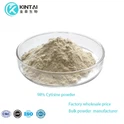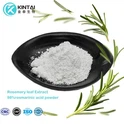Genistein powder, a potent isoflavone derived primarily from soybeans, has garnered significant attention in the health and wellness community. As more men become health-conscious and seek natural supplements to support their well-being, questions about genistein's effects on male health have become increasingly common. This blog post delves into the fascinating world of genistein powder and its potential impacts on men's health, exploring both the benefits and considerations associated with its use.

What are the potential benefits of genistein powder for men's health?
Genistein powder offers a range of potential benefits for men's health, making it an intriguing supplement for those looking to enhance their overall well-being. One of the most notable advantages is its potential to support prostate health. Studies have shown that genistein may help inhibit the growth of prostate cancer cells and reduce the risk of benign prostatic hyperplasia (BPH), a common condition in aging men that causes an enlarged prostate.
Furthermore, genistein has demonstrated promising effects on cardiovascular health. It may help reduce LDL cholesterol levels and improve overall lipid profiles, potentially lowering the risk of heart disease – a leading cause of death among men worldwide. The antioxidant properties of genistein also contribute to its heart-protective effects by combating oxidative stress and inflammation, two key factors in the development of cardiovascular issues.

Bone health is another area where genistein powder may prove beneficial for men. While osteoporosis is often considered a women's health issue, men are also at risk, especially as they age. Genistein has been shown to support bone density by promoting osteoblast activity (cells responsible for bone formation) and inhibiting osteoclast activity (cells that break down bone tissue). This dual action may help maintain stronger bones and reduce the risk of fractures in older men.
:max_bytes(150000):strip_icc()/truth-meter-healthy-bones-edition-a96f5475ebd64f2c938994cafb260766.jpg?size=752x0)
Additionally, genistein powder may offer cognitive benefits. Some studies suggest that it could help improve memory and cognitive function, potentially reducing the risk of age-related cognitive decline and neurodegenerative diseases. This is particularly relevant for men as they age and become more susceptible to conditions like Alzheimer's disease.
Lastly, genistein's anti-inflammatory properties may benefit men suffering from chronic inflammatory conditions such as arthritis or inflammatory bowel diseases. By modulating the body's inflammatory response, genistein could help alleviate symptoms and improve overall quality of life for those affected by these conditions.
Can genistein powder influence testosterone levels in men?
The relationship between genistein powder and testosterone levels in men has been a subject of considerable research and debate. Genistein is classified as a phytoestrogen, meaning it has a chemical structure similar to estrogen and can bind to estrogen receptors in the body. This has led to concerns about its potential effects on male hormones, particularly testosterone.

Some studies have suggested that high doses of genistein may have a mild estrogenic effect, potentially leading to a slight decrease in testosterone levels. However, it's crucial to note that these effects are generally observed at doses much higher than what would typically be consumed through dietary sources or standard supplementation.
On the other hand, other research has shown that moderate consumption of genistein may not significantly impact testosterone levels in healthy men. In fact, some studies have even suggested that genistein could have beneficial effects on hormonal balance by inhibiting the enzyme aromatase, which converts testosterone to estrogen. This could potentially help maintain healthy testosterone levels, especially in older men who naturally experience a decline in testosterone production.
It's also worth noting that the effects of genistein on testosterone may vary depending on individual factors such as age, overall health, and existing hormone levels. Some men may be more sensitive to the effects of phytoestrogens than others, emphasizing the importance of personalized approaches to supplementation.
For men concerned about maintaining optimal testosterone levels while benefiting from genistein's other health-promoting properties, it may be advisable to consult with a healthcare professional. They can provide guidance on appropriate dosage and monitor hormone levels to ensure that genistein supplementation aligns with individual health goals.
Moreover, it's essential to consider the broader context of men's health when evaluating the potential hormonal effects of genistein. While testosterone is undoubtedly important for various aspects of male health, it's not the only factor contributing to overall well-being. The potential benefits of genistein for prostate health, cardiovascular function, and bone density may outweigh any minor fluctuations in testosterone levels for many men.
How does genistein powder compare to other soy-based supplements for men?
When it comes to soy-based supplements for men, genistein powder stands out due to its concentrated and purified nature. Unlike whole soy products or general soy protein supplements, genistein powder offers a more targeted approach to harnessing the benefits of this specific isoflavone.
:max_bytes(150000):strip_icc()/isoflavones-benefits-side-effects-dosage-and-interactions-4687017-primary-recirc-73e50bf323144eb8961c7991e017db7b.jpg?size=767x0)
Compared to other soy-based supplements, genistein powder typically provides a higher concentration of the active compound. This means that men can potentially achieve therapeutic effects with smaller doses, reducing the overall intake of soy proteins and other compounds that may be present in less refined soy supplements.
One key advantage of genistein powder over general soy supplements is its potential for better bioavailability. The isolated form of genistein may be more easily absorbed by the body compared to genistein bound within soy protein matrices. This increased bioavailability could lead to more pronounced health benefits, even at lower doses.
Furthermore, genistein powder offers greater flexibility in terms of dosage and administration. Men can easily adjust their intake to meet specific health goals or recommendations from healthcare providers. This level of precision is often more challenging with whole soy products or less refined supplements.
For men concerned about the potential estrogenic effects of soy, genistein powder may offer a more balanced option. While genistein is indeed a phytoestrogen, research suggests that its effects are more nuanced than simply mimicking estrogen in the body. In fact, genistein has been shown to have both estrogenic and anti-estrogenic effects, depending on the tissue and physiological context. This selective action may provide benefits without some of the concerns associated with high intake of soy proteins.
Another advantage of genistein powder is its versatility. It can be easily incorporated into various dietary regimens and lifestyles. Whether mixed into smoothies, added to protein shakes, or taken in capsule form, genistein powder offers convenient options for men looking to incorporate its benefits into their daily routines.
However, it's important to note that while genistein powder offers these advantages, whole soy foods and less refined soy supplements have their own merits. They provide a broader spectrum of nutrients and beneficial compounds found in soybeans, which may offer synergistic health effects. Some men may prefer the holistic approach of consuming whole soy products as part of a balanced diet.
Ultimately, the choice between genistein powder and other soy-based supplements depends on individual health goals, preferences, and the guidance of healthcare professionals. For men seeking targeted benefits associated with genistein, such as prostate health support or bone density maintenance, genistein powder may be the most direct and efficient option. However, for those looking for the general nutritional benefits of soy, less refined supplements or whole soy foods might be more appropriate.
In conclusion, genistein powder offers a unique and potent option among soy-based supplements for men. Its concentrated nature, potential for better bioavailability, and flexibility in dosing make it an attractive choice for those seeking to harness the specific benefits of this powerful isoflavone. As with any supplement, it's crucial for men to consider their individual health needs and consult with healthcare providers to determine the most appropriate approach to incorporating genistein or other soy-based products into their health regimens.
Our Genistein Powder Bulk has received unanimous praise from customers. If you would like to know more about this product, please feel free to contact Sales@Kintaibio.Com.
References
1. Messina, M. (2010). Soybean isoflavone exposure does not have feminizing effects on men: a critical examination of the clinical evidence. Fertility and Sterility, 93(7), 2095-2104.
2. Ganry, O. (2002). Phytoestrogens and prostate cancer risk. World Journal of Urology, 20(4), 247-252.
3. Mahmoud, A. M., Yang, W., & Bosland, M. C. (2014). Soy isoflavones and prostate cancer: a review of molecular mechanisms. The Journal of Steroid Biochemistry and Molecular Biology, 140, 116-132.
4. Messina, M., & Redmond, G. (2006). Effects of soy protein and soybean isoflavones on thyroid function in healthy adults and hypothyroid patients: a review of the relevant literature. Thyroid, 16(3), 249-258.
5. Setchell, K. D., & Clerici, C. (2010). Equol: history, chemistry, and formation. The Journal of Nutrition, 140(7), 1355S-1362S.
6. Kuiper, G. G., Lemmen, J. G., Carlsson, B., Corton, J. C., Safe, S. H., Van Der Saag, P. T., ... & Gustafsson, J. Å. (1998). Interaction of estrogenic chemicals and phytoestrogens with estrogen receptor β. Endocrinology, 139(10), 4252-4263.
7. Morabito, N., Crisafulli, A., Vergara, C., Gaudio, A., Lasco, A., Frisina, N., ... & Squadrito, F. (2002). Effects of genistein and hormone‐replacement therapy on bone loss in early postmenopausal women: a randomized double‐blind placebo‐controlled study. Journal of Bone and Mineral Research, 17(10), 1904-1912.
8. Javanbakht, M. H., Sadria, R., Djalali, M., Derakhshanian, H., Hosseinzadeh, P., Zarei, M., ... & Mirshafiey, A. (2014). Soy isoflavones and knee osteoarthritis: a randomized double-blind controlled trial. Food & Function, 5(11), 2951-2957.
9. Orgaard, A., & Jensen, L. (2008). The effects of soy isoflavones on obesity. Experimental Biology and Medicine, 233(9), 1066-1080.
10. Soni, M., Rahardjo, T. B., Soekardi, R., Sulistyowati, Y., Lestariningsih, ... & Hogervorst, E. (2014). Phytoestrogens and cognitive function: a review. Maturitas, 77(3), 209-220.







